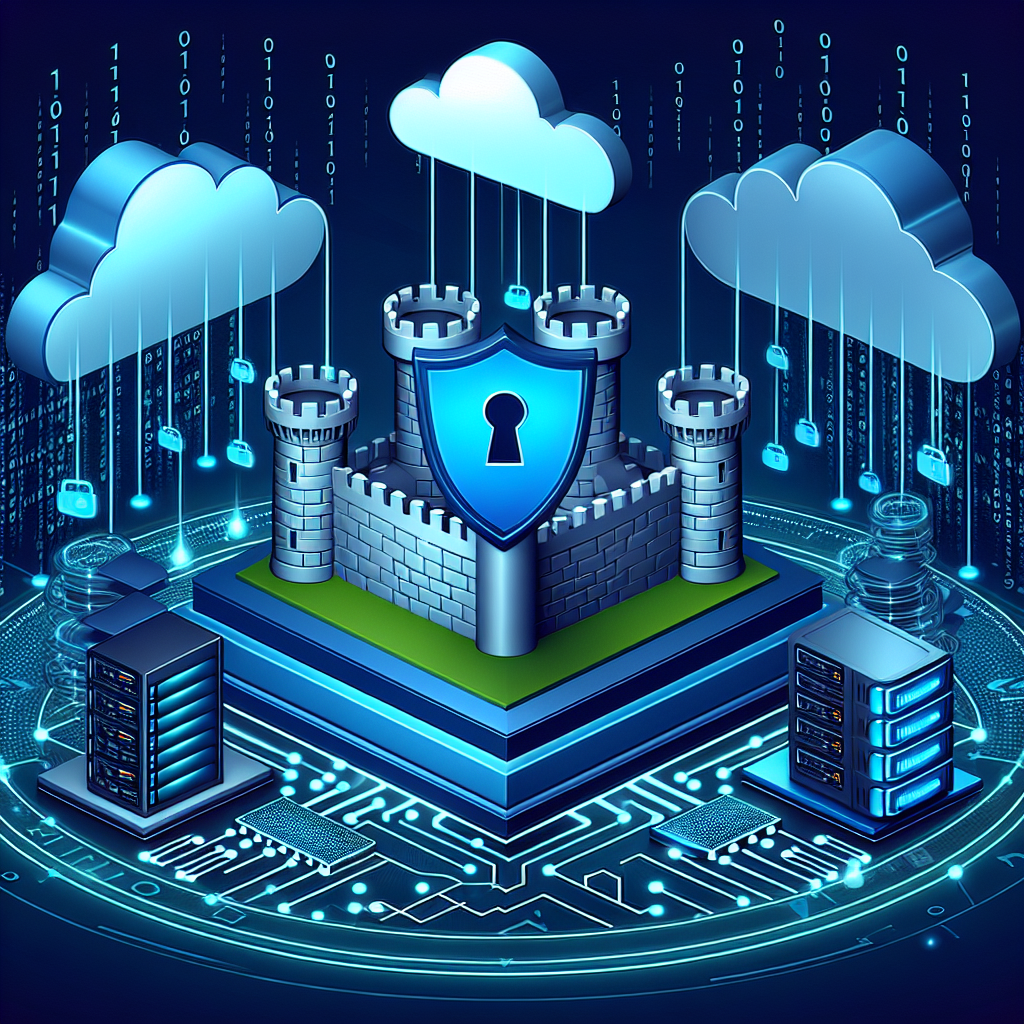Your cart is currently empty!
Tag: IT Solutions

Implementing IT Solutions for Data Security and Compliance
In today’s digital age, data security and compliance are paramount concerns for businesses of all sizes. With the increasing amount of sensitive information being stored and shared online, it is more important than ever to implement robust IT solutions to protect data and ensure regulatory compliance.One of the key challenges businesses face when it comes to data security and compliance is the ever-evolving landscape of threats and regulations. Cyberattacks are becoming increasingly sophisticated, and new regulations such as the GDPR and CCPA are placing stricter requirements on how businesses handle and protect customer data. In order to stay ahead of these challenges, businesses need to invest in IT solutions that are specifically designed to address data security and compliance needs.
There are a number of IT solutions available that can help businesses enhance their data security and compliance efforts. Encryption technologies, for example, can help businesses protect sensitive data by encoding it in a way that only authorized users can access. Multi-factor authentication (MFA) is another important tool that can help businesses prevent unauthorized access to their systems and data.
In addition to these technologies, businesses can also benefit from implementing robust data management solutions that help them track and monitor how data is being used and shared within their organization. Data loss prevention (DLP) solutions, for example, can help businesses prevent sensitive data from being leaked or stolen by monitoring and controlling how data is transferred both internally and externally.
When it comes to compliance, businesses can benefit from implementing IT solutions that help them track and manage their compliance efforts. Compliance management solutions can help businesses automate compliance processes, track compliance requirements, and generate reports to demonstrate compliance to regulators. These solutions can help businesses streamline their compliance efforts and reduce the risk of costly fines and penalties.
Ultimately, implementing IT solutions for data security and compliance is essential for businesses looking to protect their data and ensure regulatory compliance. By investing in the right technologies and solutions, businesses can enhance their security posture, reduce the risk of data breaches, and demonstrate compliance to regulators and customers. As the threat landscape continues to evolve, businesses that prioritize data security and compliance will be better positioned to protect their data and maintain the trust of their customers.

IT Solutions for Remote Workforce Management
In recent years, the concept of remote work has gained popularity among companies and organizations around the world. With advancements in technology, employees now have the ability to work from anywhere, whether it be from home, a co-working space, or even while traveling. However, managing a remote workforce comes with its own set of challenges, such as communication, collaboration, and productivity issues.Luckily, there are a variety of IT solutions available that can help companies effectively manage their remote workforce. These solutions not only streamline communication and collaboration but also ensure that employees remain productive and engaged. Here are some of the top IT solutions for remote workforce management:
1. Communication Tools: One of the most important aspects of managing a remote workforce is effective communication. Tools such as Slack, Microsoft Teams, and Zoom allow employees to easily communicate with their colleagues, share files, and collaborate on projects in real-time. These tools also provide features such as video conferencing, screen sharing, and instant messaging, making it easier for remote team members to stay connected.
2. Project Management Software: To ensure that remote employees stay on track and meet deadlines, project management software such as Asana, Trello, and Monday.com can be incredibly helpful. These tools allow managers to assign tasks, track progress, and monitor project timelines, all in one centralized location. This helps to keep remote teams organized and ensures that everyone is working towards the same goals.
3. Remote Desktop Software: Remote desktop software, such as TeamViewer and LogMeIn, allows employees to access their work computer from anywhere, as if they were sitting in the office. This is especially useful for employees who need to access specific programs or files that are only available on their work computer. Remote desktop software also provides a secure connection, ensuring that sensitive data remains protected.
4. Time Tracking Tools: To monitor the productivity of remote employees, time tracking tools like Toggl and Harvest can be used. These tools allow employees to track their time spent on different tasks and projects, providing insight into where time is being spent and how to improve efficiency. Time tracking tools also help managers to better allocate resources and identify any potential bottlenecks in workflow.
5. Cybersecurity Solutions: With remote work comes an increased risk of cybersecurity threats. To protect sensitive company data and ensure that remote employees are working in a secure environment, cybersecurity solutions such as VPNs, antivirus software, and multi-factor authentication should be implemented. These solutions help to safeguard company information and prevent unauthorized access to sensitive data.
In conclusion, managing a remote workforce can be challenging, but with the right IT solutions in place, companies can effectively manage their remote teams and ensure that employees remain productive and engaged. By utilizing communication tools, project management software, remote desktop software, time tracking tools, and cybersecurity solutions, companies can create a seamless remote work environment that fosters collaboration and productivity. Investing in these IT solutions will not only benefit remote employees but also help companies to stay competitive in today’s digital age.

Maximizing Efficiency with Managed IT Solutions
In today’s fast-paced and technology-driven world, it’s more important than ever for businesses to maximize efficiency in order to stay competitive. One way to achieve this is through the use of managed IT solutions.Managed IT solutions involve outsourcing the management of a company’s IT infrastructure to a third-party provider. This can include services such as network monitoring, data backup and recovery, cybersecurity, and technical support. By partnering with a managed IT provider, businesses can free up their internal IT team to focus on strategic initiatives, while also benefiting from the expertise and resources of an external team.
One of the key benefits of managed IT solutions is the ability to increase efficiency within an organization. By outsourcing routine IT tasks to a dedicated team of experts, businesses can improve the productivity of their employees and reduce downtime caused by technical issues. In addition, managed IT providers can proactively monitor and maintain a company’s IT systems, helping to prevent potential problems before they occur.
Another advantage of managed IT solutions is the cost savings they can provide. By outsourcing IT management to a third-party provider, businesses can eliminate the need to hire and train internal IT staff, as well as invest in expensive hardware and software. Managed IT providers typically offer flexible pricing plans that can be tailored to a company’s specific needs and budget, making it a cost-effective solution for businesses of all sizes.
Furthermore, managed IT solutions can help businesses stay ahead of the curve when it comes to technology. With rapid advancements in IT, it can be challenging for businesses to keep up with the latest trends and innovations. Managed IT providers are constantly updating their skills and knowledge to ensure they are equipped to handle the latest technologies, giving businesses a competitive edge in their industry.
Overall, maximizing efficiency with managed IT solutions is a smart investment for businesses looking to streamline their operations, reduce costs, and stay ahead of the competition. By outsourcing IT management to a third-party provider, businesses can benefit from improved productivity, cost savings, and access to the latest technologies. If you’re looking to take your business to the next level, consider partnering with a managed IT provider today.

The Importance of Cybersecurity in IT Solutions
In today’s digital age, the importance of cybersecurity in IT solutions cannot be overstated. With the increasing reliance on technology for business operations, communication, and data storage, the threat of cyberattacks has become a major concern for organizations of all sizes. It is crucial for businesses to prioritize cybersecurity measures to protect their sensitive information, maintain the trust of their customers, and safeguard their reputation.Cybersecurity refers to the practice of protecting computer systems, networks, and data from malicious attacks, unauthorized access, and other cyber threats. This includes implementing measures such as firewalls, encryption, multi-factor authentication, and regular security audits to ensure that sensitive information is safe from hackers and cybercriminals.
One of the key reasons why cybersecurity is essential in IT solutions is to prevent data breaches. Data breaches can have devastating consequences for businesses, leading to financial losses, damage to reputation, and legal repercussions. By implementing robust cybersecurity measures, organizations can minimize the risk of data breaches and protect their valuable information from falling into the wrong hands.
Additionally, cybersecurity is important for ensuring compliance with regulations and standards. Many industries have strict regulatory requirements for data protection, such as the Health Insurance Portability and Accountability Act (HIPAA) for healthcare organizations and the General Data Protection Regulation (GDPR) for businesses operating in the European Union. Failure to comply with these regulations can result in hefty fines and penalties, making cybersecurity a critical aspect of IT solutions.
Moreover, cybersecurity is crucial for maintaining the trust of customers and stakeholders. In today’s digital world, consumers are increasingly concerned about the security of their personal information, and a data breach can erode trust and loyalty in a business. By prioritizing cybersecurity, organizations can demonstrate their commitment to protecting customer data and maintaining a secure environment for transactions and communication.
In conclusion, the importance of cybersecurity in IT solutions cannot be ignored. It is essential for businesses to invest in cybersecurity measures to protect their sensitive information, prevent data breaches, comply with regulations, and maintain the trust of their customers. By prioritizing cybersecurity, organizations can mitigate the risks associated with cyber threats and safeguard their reputation in an increasingly digital world.

10 IT Solutions Every Business Needs in 2021
In today’s digital age, having the right IT solutions in place is crucial for the success of any business. With technology constantly evolving, it can be challenging to keep up with the latest trends and tools that can help streamline operations and improve efficiency. In 2021, there are 10 IT solutions that every business should consider implementing to stay ahead of the competition.1. Cloud Computing
Cloud computing has become a staple in the business world, allowing companies to store, manage, and access data and applications over the internet. By moving to the cloud, businesses can reduce costs, increase flexibility, and improve collaboration among employees.
2. Cybersecurity
With cyber threats becoming more sophisticated, investing in cybersecurity solutions is essential to protect sensitive data and prevent cyber attacks. Implementing firewalls, antivirus software, and encryption tools can help safeguard your business from potential security breaches.
3. Remote Work Solutions
The COVID-19 pandemic has forced many businesses to adopt remote work policies, making it crucial to have the right tools in place to support a remote workforce. Video conferencing tools, collaboration platforms, and virtual private networks (VPNs) are essential for facilitating communication and collaboration among remote employees.
4. Data Analytics
Data analytics tools can help businesses make informed decisions by analyzing and interpreting data to identify trends and patterns. By leveraging data analytics, businesses can gain valuable insights into customer behavior, market trends, and operational performance.
5. Customer Relationship Management (CRM) Software
CRM software is essential for managing customer relationships and improving customer satisfaction. By centralizing customer data and tracking interactions, businesses can better understand their customers’ needs and preferences, leading to improved customer retention and loyalty.
6. Enterprise Resource Planning (ERP) Systems
ERP systems integrate key business processes such as finance, human resources, and supply chain management into a single platform, streamlining operations and improving efficiency. By implementing an ERP system, businesses can reduce manual processes and improve decision-making.
7. Mobile Device Management (MDM)
With the rise of mobile devices in the workplace, businesses need to implement mobile device management solutions to secure and manage company-owned and employee-owned devices. MDM solutions can help enforce security policies, track device usage, and remotely wipe data in case of loss or theft.
8. Business Intelligence Tools
Business intelligence tools help businesses analyze and visualize data to gain insights into their operations and make data-driven decisions. By using business intelligence tools, businesses can monitor key performance indicators, track progress towards goals, and identify areas for improvement.
9. VoIP Phone Systems
Voice over Internet Protocol (VoIP) phone systems allow businesses to make and receive calls over the internet, reducing costs and improving communication efficiency. VoIP phone systems also offer advanced features such as call forwarding, voicemail to email, and conference calling.
10. IT Help Desk Software
IT help desk software is essential for managing and resolving IT issues efficiently. By implementing help desk software, businesses can streamline ticketing, track issue resolution, and provide timely support to employees and customers.
In conclusion, investing in the right IT solutions can help businesses stay competitive and adapt to the ever-changing technological landscape. By implementing cloud computing, cybersecurity, remote work solutions, data analytics, CRM software, ERP systems, MDM, business intelligence tools, VoIP phone systems, and IT help desk software, businesses can improve productivity, enhance security, and drive growth in 2021 and beyond.

Enhancing Customer Experience with IT Solutions
In today’s digital age, customer experience has become a key differentiator for businesses looking to stand out in a crowded marketplace. With increasing competition and evolving customer expectations, companies are constantly seeking ways to enhance the way they engage with their customers. One of the most effective ways to improve customer experience is by leveraging IT solutions.IT solutions play a crucial role in enhancing customer experience by providing businesses with the tools and technologies they need to deliver personalized, efficient, and seamless interactions with their customers. From customer relationship management (CRM) systems to chatbots and self-service portals, IT solutions can help businesses streamline their processes, improve communication, and ultimately, create a more satisfying customer experience.
One of the key benefits of using IT solutions to enhance customer experience is the ability to provide personalized and targeted interactions. By leveraging data analytics and customer insights, businesses can gain a better understanding of their customers’ needs and preferences, allowing them to tailor their products and services to better meet those needs. This personalized approach not only helps businesses build stronger relationships with their customers but also increases customer loyalty and retention.
Another way IT solutions can enhance customer experience is by improving communication and responsiveness. With the help of communication tools such as chatbots and automated messaging systems, businesses can provide real-time support and assistance to their customers, ensuring that their needs are met promptly and efficiently. This level of responsiveness can help businesses build trust and credibility with their customers, leading to a more positive overall experience.
Additionally, IT solutions can help businesses streamline their processes and operations, making it easier for customers to access information, make purchases, and resolve issues. Self-service portals and online ordering systems, for example, can eliminate the need for customers to wait in long lines or navigate complex phone menus, allowing them to complete transactions quickly and easily. This convenience not only improves the customer experience but also helps businesses increase efficiency and reduce costs.
In conclusion, IT solutions play a crucial role in enhancing customer experience by providing businesses with the tools and technologies they need to deliver personalized, efficient, and seamless interactions with their customers. By leveraging data analytics, communication tools, and streamlined processes, businesses can create a more satisfying customer experience that leads to increased loyalty, retention, and ultimately, business success. Investing in IT solutions to enhance customer experience is not only a smart business decision but also a necessary one in today’s competitive marketplace.

Cybersecurity: The Importance of IT Solutions
In today’s digital age, cybersecurity has become a critical concern for businesses of all sizes. The rise of cyber threats such as malware, ransomware, and phishing attacks has made it essential for companies to invest in robust IT solutions to protect their sensitive data and systems.One of the main reasons why cybersecurity is so important is the potential financial impact of a data breach. According to a report by IBM, the average cost of a data breach in 2020 was $3.86 million. This includes expenses related to investigating the breach, notifying affected customers, and implementing security measures to prevent future incidents. In addition to the financial costs, a data breach can also damage a company’s reputation and erode customer trust.
IT solutions play a crucial role in safeguarding against cyber threats by implementing layers of security measures to protect data and systems. This includes firewalls, antivirus software, intrusion detection systems, and encryption technologies. These tools help to detect and prevent unauthorized access to a company’s network, as well as identify and mitigate potential security vulnerabilities.
Moreover, IT solutions can also help businesses stay compliant with industry regulations and standards related to cybersecurity. For example, the General Data Protection Regulation (GDPR) requires companies to implement appropriate security measures to protect the personal data of EU citizens. Failure to comply with these regulations can result in hefty fines and legal consequences.
Another key benefit of investing in IT solutions for cybersecurity is the ability to proactively monitor and respond to security incidents. This includes conducting regular security audits, penetration testing, and threat intelligence analysis to identify and address potential vulnerabilities before they are exploited by cybercriminals.
Overall, cybersecurity is a critical aspect of modern business operations, and the importance of IT solutions cannot be overstated. By investing in robust security measures and staying vigilant against evolving cyber threats, companies can protect their sensitive data, safeguard their reputation, and ensure the long-term success of their business.

Streamlining Operations with Cloud-Based IT Solutions
In today’s fast-paced business world, companies are constantly looking for ways to streamline their operations and improve efficiency. One solution that has gained popularity in recent years is the use of cloud-based IT solutions. These solutions offer a wide range of benefits, including increased flexibility, scalability, and cost savings.One of the key advantages of using cloud-based IT solutions is the ability to access data and applications from anywhere, at any time. This can be particularly beneficial for companies with remote or distributed teams, as it allows employees to collaborate and work together seamlessly, regardless of their physical location. Additionally, cloud-based solutions can easily be scaled up or down to meet changing business needs, making them a cost-effective option for businesses of all sizes.
Another advantage of cloud-based IT solutions is the ability to streamline and automate processes. By moving key business applications and data to the cloud, companies can reduce the need for manual data entry and streamline workflows. This not only saves time and reduces the risk of errors, but also frees up employees to focus on more strategic tasks.
Cloud-based IT solutions also offer enhanced security features, helping to protect sensitive data and prevent cybersecurity threats. Many cloud providers offer advanced encryption and authentication protocols, as well as regular security updates and monitoring. This can provide companies with peace of mind knowing that their data is safe and secure in the cloud.
Overall, streamlining operations with cloud-based IT solutions can help companies improve efficiency, reduce costs, and increase productivity. By leveraging the power of the cloud, businesses can stay competitive in today’s digital landscape and drive growth and innovation.

How IT Solutions Can Drive Business Growth
In today’s digital age, having effective IT solutions in place can make a significant impact on driving business growth. From streamlining processes to improving customer experiences, technology plays a crucial role in helping businesses stay competitive and agile in a fast-paced market.One of the key ways in which IT solutions can drive business growth is by increasing efficiency and productivity. By automating repetitive tasks, businesses can save time and resources, allowing employees to focus on more strategic initiatives that drive growth. For example, implementing a customer relationship management (CRM) system can help businesses manage customer relationships more effectively, leading to increased sales and customer satisfaction.
IT solutions also play a crucial role in enabling businesses to scale and expand. Cloud computing, for example, allows businesses to easily scale their infrastructure as they grow, without the need for costly hardware upgrades. This flexibility not only saves money but also allows businesses to quickly respond to changes in the market and seize new opportunities.
Furthermore, IT solutions can also improve collaboration and communication within an organization, leading to better decision-making and innovation. With tools like video conferencing, project management software, and instant messaging, teams can work together more efficiently, regardless of their location. This seamless collaboration can lead to faster problem-solving, increased creativity, and ultimately, business growth.
Additionally, IT solutions can also help businesses better understand their customers and market trends. Data analytics tools can provide valuable insights into customer behavior, preferences, and buying patterns, allowing businesses to tailor their products and services to meet customer needs. By leveraging this data, businesses can make more informed decisions and drive growth by targeting the right audience with the right solutions.
In conclusion, IT solutions are essential for businesses looking to drive growth and stay ahead of the competition. From increasing efficiency and productivity to enabling scalability and innovation, technology plays a crucial role in shaping the future of business. By investing in the right IT solutions and leveraging them effectively, businesses can unlock new opportunities, drive growth, and achieve long-term success in today’s digital economy.

Maximizing Efficiency with Innovative IT Solutions
In today’s fast-paced business world, efficiency is key to staying ahead of the competition. Companies are constantly looking for ways to streamline their processes and increase productivity. One way to achieve this is through the use of innovative IT solutions.IT solutions have revolutionized the way businesses operate, providing tools and technologies that can automate tasks, improve communication, and enhance collaboration. By leveraging these solutions, companies can maximize efficiency and optimize their operations.
One of the key benefits of using IT solutions is the ability to automate repetitive tasks. This can free up employees to focus on more strategic and value-added activities, leading to increased productivity and efficiency. For example, workflow automation tools can streamline processes such as invoice processing, employee onboarding, and customer service inquiries, reducing the time and effort required to complete these tasks.
Another way IT solutions can maximize efficiency is by improving communication and collaboration within the organization. Cloud-based collaboration tools such as Microsoft Teams and Slack allow employees to easily communicate and share information, regardless of their location. This can help teams work more efficiently, make decisions faster, and ultimately drive better results.
Additionally, IT solutions can help companies make data-driven decisions by providing real-time insights and analytics. Business intelligence tools can analyze large amounts of data to identify trends, patterns, and opportunities for improvement. This can help companies optimize their processes, identify areas for cost savings, and make more informed decisions.
Furthermore, IT solutions can also enhance customer experiences by providing personalized and seamless interactions. Customer relationship management (CRM) systems can track customer interactions, preferences, and buying behavior, allowing companies to tailor their products and services to meet their customers’ needs. This can lead to increased customer satisfaction, loyalty, and ultimately, business growth.
In conclusion, maximizing efficiency with innovative IT solutions is essential for companies looking to stay competitive in today’s digital age. By automating tasks, improving communication, leveraging data insights, and enhancing customer experiences, businesses can streamline their operations, increase productivity, and drive better results. Investing in IT solutions is not only a smart business decision but also a necessary one for companies looking to thrive in a fast-paced and competitive marketplace.
